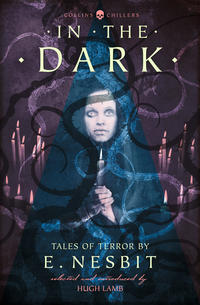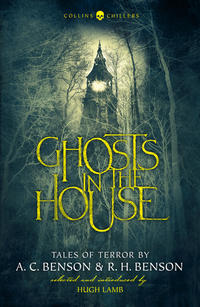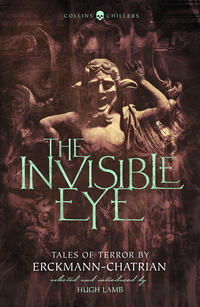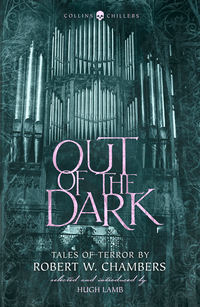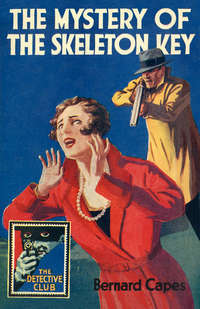
Полная версия
Out of the Dark: Tales of Terror by Robert W. Chambers
We spoke of the murder of Professor La Grange, of how it had been concealed by the authorities in New York at Drummond’s request, of the certainty that it was one of the gang of gold-makers who had done it, and of the possible alertness of the gang.
‘Oh, they know that Drummond will be after them sooner or later,’ said Barris, ‘but they don’t know that the mills of the gods have already begun to grind. Those smart New York papers built better than they knew when their ferret-eyed reporter poked his red nose into the house on 58th Street and sneaked off with a column on his cuffs about the “suicide” of Professor La Grange. Bill Pierpont, my revolver is hanging in your room; I’ll take yours too—’
‘Help yourself,’ said Pierpont.
‘I shall be gone over night,’ continued Barris; ‘my poncho and some bread and meat are all I shall take except the “barkers”.’
‘Will they bark tonight?’ I asked.
‘No, I trust not for several weeks yet. I shall nose about a bit. Roy, did it ever strike you how queer it is that this wonderfully beautiful country should contain no inhabitants?’
‘It’s like those splendid stretches of pools and rapids which one finds on every trout river and in which one never finds a fish,’ suggested Pierpont.
‘Exactly – and Heaven alone knows why,’ said Barris; ‘I suppose this country is shunned by human beings for the same mysterious reasons.’
‘The shooting is the better for it,’ I observed.
‘The shooting is good,’ said Barris, ‘have you noticed the snipe on the meadow by the lake? Why it’s brown with them! That’s a wonderful meadow.’
‘It’s a natural one,’ said Pierpont, ‘no human being ever cleared that land.’
‘Then it’s supernatural,’ said Barris; ‘Pierpont, do you want to come with me?’
Pierpont’s handsome face flushed as he answered slowly, ‘It’s awfully good of you – if I may.’
‘Bosh,’ said I, piqued because he had asked Pierpont, ‘what use is little Willy without his man?’
‘True,’ said Barris gravely, ‘you can’t take Howlett you know.’
Pierpont muttered something which ended in ‘d—n’.
‘Then,’ said I, ‘there will be but one gun on the Sweet Fern Covert this afternoon. Very well, I wish you joy of your cold supper and cold bed. Take your nightgown, Willy, and don’t sleep on the damp ground.’
‘Let Pierpont alone,’ retorted Barris, ‘you shall go next time, Roy.’
‘Oh, all right – you mean when there’s shooting going on?’
‘And I?’ demanded Pierpont grieved.
‘You too, my son; stop quarrelling! Will you ask Howlett to pack our kits – lightly mind you – no bottles – they clink.’
‘My flask doesn’t,’ said Pierpont, and went off to get ready for a night’s stalking of dangerous men.
‘It is strange,’ said I, ‘that nobody ever settles in this region. How many people live in Cardinal Springs, Barris?’
‘Twenty counting the telegraph operator and not counting the lumbermen; they are always changing and shifting. I have six men among them.’
‘Where have you no men? In the Four Hundred?’
‘I have men there also – chums of Billy’s only he doesn’t know it. David tells me that there was a strong flight of woodcock last night. You ought to pick up some this afternoon.’
Then we chatted about alder-cover and swamp until Pierpont came out of the house and it was time to part.
‘Au revoir,’ said Barris, buckling on his kit, ‘come along, Pierpont, and don’t walk in the damp grass.’
‘If you are not back by tomorrow noon,’ said I, ‘I will take Howlett and David and hunt you up. You say your course is due north?’
‘Due north,’ replied Barris, consulting his compass.
‘There is a trail for two miles and a spotted lead for two more,’ said Pierpont.
‘Which we won’t use for various reasons,’ added Barris pleasantly; ‘don’t worry, Roy, and keep your confounded expedition out of the way; there’s no danger.’
He knew, of course, what he was talking about and I held my peace.
When the tip end of Pierpont’s shooting coat had disappeared in the Long Covert, I found myself standing alone with Howlett. He bore my gaze for a moment and then politely lowered his eyes.
‘Howlett,’ said I, ‘take these shells and implements to the gun room, and drop nothing. Did Voyou come to any harm in the briers this morning?’
‘No ’arm, Mr Cardenhe, sir,’ said Howlett.
‘Then be careful not to drop anything else,’ said I, and walked away leaving him decorously puzzled. For he had dropped no cartridges. Poor Howlett!
III
About four o’clock that afternoon I met David and the dogs at the spinney which leads into Sweet Fern Covert. The three setters, Voyou, Gamin, and Mioche were in fine feather – David had killed a woodcock and a brace of grouse over them that morning – and they were thrashing about the spinney at short range when I came up, gun under arm and pipe lighted.
‘What’s the prospect, David,’ I asked, trying to keep my feet in the tangle of wagging, whining dogs; ‘hello, what’s amiss with Mioche?’
‘A brier in his foot sir; I drew it and stopped the wound but I guess the gravel’s got in. If you have no objection, sir, I might take him back with me.’
‘It’s safer,’ I said; ‘take Gamin too, I only want one dog this afternoon. What is the situation?’
‘Fair sir; the grouse lie within a quarter of a mile of the oak second growth. The woodcock are mostly on the alders. I saw any number of snipe in the meadows. There’s something else in by the lake – I can’t just tell what, but the woodduck set up a clatter when I was in the thicket and they come dashing through the wood as if a dozen foxes was snappin’ at their tail feathers.’
‘Probably a fox,’ I said; ‘leash those dogs – they must learn to stand it. I’ll be back by dinner time.’
‘There is one more thing sir,’ said David, lingering with his gun under his arm.
‘Well,’ said I.
‘I saw a man in the woods by the Oak Covert – at least I think I did.’
‘A lumberman?’
‘I think not sir – at least – do they have Chinamen among them?’
‘Chinese? No. You didn’t see a Chinaman in the woods here?’
‘I – I think I did sir – I can’t say positively. He was gone when I ran into the covert.’
‘Did the dogs notice it?’
‘I can’t say – exactly. They acted queer like. Gamin here lay down and whined – it may have been colic – and Mioche whimpered – perhaps it was the brier.’
‘And Voyou?’
‘Voyou, he was most remarkable sir, and the hair on his back stood up. I did see a groundhog makin’ for a tree near by.’
‘Then no wonder Voyou bristled. David, your Chinaman was a stump or tussock. Take the dogs now.’
‘I guess it was sir; good afternoon sir,’ said David, and walked away with the Gordons leaving me alone with Voyou in the spinney.
I looked at the dog and he looked at me.
‘Voyou!’
The dog sat down and danced with his fore feet, his beautiful brown eyes sparkling.
‘You’re a fraud,’ I said; ‘which shall it be, the alders or the upland? Upland? Good! – now for the grouse – heel, my friend, and show your miraculous self-restraint.’
Voyou wheeled into my tracks and followed closely, nobly refusing to notice the impudent chipmunks and the thousand and one alluring and important smells which an ordinary dog would have lost no time in investigating.
The brown and yellow autumn woods were crisp with drifting heaps of leaves and twigs that crackled under foot as we turned from the spinney into the forest. Every silent little stream, hurrying toward the lake, was gay with painted leaves afloat, scarlet maple or yellow oak. Spots of sunlight fell upon the pools, searching the brown depths, illuminating the gravel bottom where shoals of minnows swam to and fro, and to and fro again, busy with the purpose of their little lives. The crickets were chirping in the long brittle grass on the edge of the woods, but we left them far behind in the silence of the deeper forest.
‘Now!’ said I to Voyou.
The dog sprang to the front, circled once, zigzagged through the ferns around us and, all in a moment, stiffened stock still, rigid as sculptured bronze. I stepped forward, raising my gun, two paces, three paces, ten perhaps, before a great cock grouse blundered up from the brake and burst through the thicket fringe toward the deeper growth. There was a flash and puff from my gun, a crash of echoes among the low wooded cliffs, and through the faint veil of smoke something dark dropped from mid-air amid a cloud of feathers, brown as the brown leaves under foot.
‘Fetch!’
Up from the ground sprang Voyou, and in a moment he came galloping back, neck arched, tail stiff but waving, holding tenderly in his pink mouth a mass of mottled bronzed feathers. Very gravely he laid the bird at my feet and crouched beside it, his silky ears across his paws, his muzzle on the ground.
I dropped the grouse into my pocket, held for a moment a silent caressing communion with Voyou, then swung my gun under my arm and motioned the dog on.
It must have been five o’clock when I walked into a little opening in the woods and sat down to breathe. Voyou came and sat down in front of me.
‘Well?’ I enquired.
Voyou gravely presented one paw which I took.
‘We will never get back in time for dinner,’ said I, ‘so we might as well take it easy. It’s all your fault, you know. Is there a brier in your foot? – let’s see – there! it’s out my friend and you are free to nose about and lick it. If you loll your tongue out you’ll get it all over twigs and moss. Can’t you lie down and try to pant less? No, there is no use in sniffing and looking at that fern patch, for we are going to smoke a little, doze a little, and go home by moonlight. Think what a big dinner we will have! Think of Howlett’s despair when we are not in time! Think of all the stories you will have to tell to Gamin and Mioche! Think what a good dog you have been! There – you are tired old chap; take forty winks with me.’
Voyou was tired. He stretched out on the leaves at my feet but whether or not he really slept I could not be certain, until his hind legs twitched and I knew he was dreaming of mighty deeds.
Now I may have taken forty winks, but the sun seemed to be no lower when I sat up and unclosed my lids. Voyou raised his head, saw in my eyes that I was not going yet, thumped his tail half a dozen times on the dried leaves, and settled back with a sigh.
I looked lazily around, and for the first time noticed what a wonderfully beautiful spot I had chosen for a nap. It was an oval glade in the heart of the forest, level and carpeted with green grass. The trees that surrounded it were gigantic; they formed one towering circular wall of verdure, blotting out all except the turquoise blue of the sky-oval above. And now I noticed that in the center of the greensward lay a pool of water, crystal clear, glimmering like a mirror in the meadow grass, beside a block of granite. It scarcely seemed possible that the symmetry of tree and lawn and lucent pool could have been one of nature’s accidents. I had never before seen this glade nor had I ever heard it spoken of by either Pierpont or Barris. It was a marvel, this diamond-clear basin, regular and graceful as a Roman fountain, set in the gem of turf. And these great trees – they also belonged, not in America but in some legend-haunted forest of France, where moss-grown marbles stand neglected in dim glades, and the twilight of the forest shelters fairies and slender shapes from shadow-land.
I lay and watched the sunlight showering the tangled thicket where masses of crimson cardinal flowers glowed, or where one long dusty sunbeam tipped the edge of the floating leaves in the pool, turning them to palest gilt. There were birds too, passing through the dim avenues of trees like jets of flame – the gorgeous cardinal bird in his deep stained crimson robe – the bird that gave to the woods, to the village fifteen miles away, to the whole country, the name of Cardinal.
I rolled over on my back and looked up at the sky. How pale – paler than a robin’s egg – it was. I seemed to be lying at the bottom of a well, walled with verdure, high towering on every side. And, as I lay, all about me the air became sweet scented. Sweeter and sweeter and more penetrating grew the perfume, and I wondered what stray breeze, blowing over acres of lilies could have brought it. But there was no breeze; the air was still. A gilded fly alighted on my hand – a honey fly. It was as troubled as I by the scented silence.
Then, behind me, my dog growled.
I sat quite still at first, hardly breathing, but my eyes were fixed on a shape that moved along the edge of the pool among the meadow grasses. The dog had ceased growling and was now staring, alert and trembling.
At last I rose and walked rapidly down to the pool, my dog following close to heel.
The figure, a woman’s, turned slowly toward us.
IV
She was standing still when I approached the pool. The forest around us was so silent that when I spoke the sound of my own voice startled me.
‘No,’ she said – and her voice was smooth as flowing water, ‘I have not lost my way. Will he come to me, your beautiful dog?’
Before I could speak, Voyou crept to her and laid his silky head against her knees.
‘But surely,’ said I, ‘you did not come here alone.’
‘Alone? I did come alone.’
‘But the nearest settlement is in Cardinal, probably nineteen miles from where we are standing.’
‘I do not know Cardinal,’ she said.
‘Ste. Croix in Canada is forty miles at least – how did you come into the Cardinal Woods?’ I asked amazed.
‘Into the woods?’ she repeated a little impatiently.
‘Yes.’
She did not answer at first but stood caressing Voyou with gentle phrase and gesture.
‘Your beautiful dog I am fond of, but I am not fond of being questioned,’ she said quietly. ‘My name is Ysonde and I came to the fountain here to see your dog.’
I was properly quenched. After a moment or two I did say that in another hour it would be growing dusky, but she neither replied nor looked at me.
‘This,’ I ventured, ‘is a beautiful pool – you call it a fountain – a delicious fountain: I have never before seen it. It is hard to imagine that nature did all this.’
‘Is it?’ she said.
‘Don’t you think so?’ I asked.
‘I haven’t thought; I wish when you go you would leave me your dog.’
‘My – my dog?’
‘If you don’t mind,’ she said sweetly, and looked at me for the first time in the face.
For an instant our glances met, then she grew grave, and I saw that her eyes were fixed on my forehead. Suddenly she rose and drew nearer, looking intently at my forehead. There was a faint mark there, a tiny crescent, just over my eyebrow. It was a birthmark.
‘Is that a scar?’ she demanded drawing nearer.
‘That crescent-shaped mark? No.’
‘No? Are you sure?’ she insisted.
‘Perfectly,’ I replied, astonished.
‘A—a birthmark?’
‘Yes – may I ask why?’
As she drew away from me, I saw that the color had fled from her cheeks. For a second she clasped both hands over her eyes as if to shut out my face, then slowly dropping her hands, she sat down on a long square block of stone which half encircled the basin, and on which to my amazement I saw carving. Voyou went to her again and laid his head in her lap.
‘What is your name?’ she asked at length.
‘Roy Cardenhe.’
‘Mine is Ysonde. I carved these dragonflies on the stone, these fishes and shells and butterflies you see.’
‘You! They are wonderfully delicate – but those are not American dragonflies—’
‘No – they are more beautiful. See, I have my hammer and chisel with me.’
She drew from a queer pouch at her side a small hammer and chisel and held them toward me.
‘You are very talented,’ I said, ‘where did you study?’
‘I? I never studied – I knew how. I saw things and cut them out of stone. Do you like them? Some time I will show you other things that I have done. If I had a great lump of bronze I could make your dog, beautiful as he is.’
Her hammer fell into the fountain and I leaned over and plunged my arm into the water to find it.
‘It is there, shining on the sand,’ she said, leaning over the pool with me.
‘Where,’ said I, looking at our reflected faces in the water. For it was only in the water that I had dared, as yet, to look her long in the face.
The pool mirrored the exquisite oval of her head, the heavy hair, the eyes. I heard the silken rustle of her girdle, I caught the flash of a white arm, and the hammer was drawn up dripping with spray.
The troubled surface of the pool grew calm and again I saw her eyes reflected.
‘Listen,’ she said in a low voice, ‘do you think you will come again to my fountain?’
‘I will come,’ I said. My voice was dull; the noise of water filled my ears.
Then a swift shadow sped across the pool; I rubbed my eyes. Where her reflected face had bent beside mine there was nothing mirrored but the rosy evening sky with one pale star glimmering. I drew myself up and turned. She was gone. I saw the faint star twinkling above me in the afterglow, I saw the tall trees motionless in the still evening air, I saw my dog slumbering at my feet.
The sweet scent in the air had faded, leaving in my nostrils the heavy odor of fern and forest mould. A blind fear seized me, and I caught up my gun and sprang into the darkening woods. The dog followed me, crashing through the undergrowth at my side. Duller and duller grew the light, but I strode on, the sweat pouring from my face and hair, my mind a chaos. How I reached the spinney I can hardly tell. As I turned up the path I caught a glimpse of a human face peering at me from the darkening thicket – a horrible human face, yellow and drawn with high-boned cheeks and narrow eyes.
Involuntarily I halted; the dog at my heels snarled. Then I sprang straight at it, floundering blindly through the thicket, but the night had fallen swiftly and I found myself panting and struggling in a maze of twisted shrubbery and twining vines, unable to see the very undergrowth that ensnared me.
It was a pale face, and a scratched one that I carried to a late dinner that night. Howlett served me, dumb reproach in his eyes, for the soup had been standing and the grouse was juiceless.
David brought the dogs in after they had had their supper, and I drew my chair before the blaze and set my ale on a table beside me. The dogs curled up at my feet, blinking gravely at the sparks that snapped and flew in eddying showers from the heavy birch logs.
‘David,’ said I, ‘did you say you saw a Chinaman today?’
‘I did sir.’
‘What do you think about it now?’
‘I may have been mistaken sir—’
‘But you think not. What sort of whiskey did you put in my flask today?’
‘The usual sir.’
‘Is there much gone?’
‘About three swallows sir, as usual.’
‘You don’t suppose there could have been any mistake about that whiskey – no medicine could have gotten into it for instance.’
David smiled and said, ‘No sir.’
‘Well,’ said I, ‘I have had an extraordinary dream.’
When I said ‘dream’, I felt comforted and reassured. I had scarcely dared to say it before, even to myself.
‘An extraordinary dream,’ I repeated; ‘I fell asleep in the woods about five o’clock, in that pretty glade where the fountain – I mean the pool is. You know the place?’
‘I do not sir.’
I described it minutely, twice, but David shook his head.
‘Carved stone did you say sir? I never chanced on it. You don’t mean the New Spring—’
‘No, no! This glade is way beyond that. Is it possible that any people inhabit the forest between here and the Canada line?’
‘Nobody short of Ste. Croix; at least I have no knowledge of any.’
‘Of course,’ said I, ‘when I thought I saw a Chinaman, it was imagination. Of course I had been more impressed than I was aware of by your adventure. Of course you saw no Chinaman, David.’
‘Probably not sir,’ replied David dubiously.
I sent him off to bed, saying I should keep the dogs with me all night; and when he was gone, I took a good long draught of ale, ‘just to shame the devil’, as Pierpont said, and lighted a cigar. Then I thought of Barris and Pierpont, and their cold bed, for I knew they would not dare build a fire, and, in spite of the hot chimney corner and the crackling blaze, I shivered in sympathy.
‘I’ll tell Barris and Pierpont the whole story and take them to see the carved stone and the fountain,’ I thought to myself; what a marvelous dream it was – Ysonde – if it was a dream.
Then I went to the mirror and examined the faint white mark above my eyebrow.
V
About eight o’clock next morning, as I sat listlessly eyeing my coffee cup which Howlett was filling, Gamin and Mioche set up a howl, and in a moment more I heard Barris’ step on the porch.
‘Hello, Roy,’ said Pierpont, stamping into the dining room, ‘I want my breakfast by jingo! Where’s Howlett – none of your café au lait for me – I want a chop and some eggs. Look at that dog, he’ll wag the hinge off his tail in a moment—’
‘Pierpont,’ said I, ‘this loquacity is astonishing but welcome. Where’s Barris? You are soaked from neck to ankle.’
Pierpont sat down and tore off his stiff muddy leggings.
‘Barris is telephoning to Cardinal Springs – I believe he wants some of his men – down! Gamin, you idiot! Howlett, three eggs poached and more toast – what was I saying? Oh, about Barris; he’s struck something or other which he hopes will locate these gold-making fellows. I had a jolly time – he’ll tell you about it.’
‘Billy! Billy!’ I said in pleased amazement, ‘you are learning to talk! Dear me! You load your shells and you carry your own gun and you fire it yourself – hello! here’s Barris all over mud. You fellows really ought to change your rig – whew! what a frightful odor!’
‘It’s probably this,’ said Barris tossing something onto the hearth where it shuddered for a moment and then began to writhe; ‘I found it in the woods by the lake. Do you know what it can be, Roy?’
To my disgust I saw it was another of those spidery wormy crablike creatures that Godfrey had in Tiffany’s.
‘I thought I recognized that acrid odor,’ I said; ‘for the love of the Saints take it away from the breakfast table, Barris!’
‘But what is it?’ he persisted, unslinging his field-glasses and revolver.
‘I’ll tell you what I know after breakfast,’ I replied firmly, ‘Howlett, get a broom and sweep that thing into the road – what are you laughing at, Pierpont?’
Howlett swept the repulsive creature out and Barris and Pierpont went to change their dew-soaked clothes for dryer raiment. David came to take the dogs for an airing and in a few minutes Barris reappeared and sat down in his place at the head of the table.
‘Well,’ said I, ‘is there a story to tell?’
‘Yes, not much. They are near the lake on the other side of the woods – I mean these gold-makers. I shall collar one of them this evening. I haven’t located the main gang with any certainty – shove the toast rack this way will you, Roy – no, I am not at all certain, but I’ve nailed one anyway. Pierpont was a great help, really – and, what do you think, Roy? He wants to join the Secret Service!’
‘Little Willy!’
‘Exactly. Oh, I’ll dissuade him. What sort of reptile was it that I brought in? Did Howlett sweep it away?’
‘He can sweep it back again for all I care,’ I said indifferently, ‘I’ve finished my breakfast.’


